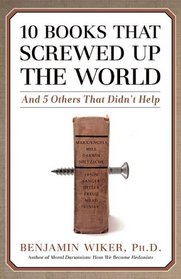Search -
10 Books That Screwed Up the World: And 5 Others That Didn't Help
10 Books That Screwed Up the World And 5 Others That Didn't Help
Author:
You've heard of the "Great Books"? — These are their evil opposites. From Machiavelli's The Prince to Karl Marx's The Communist Manifesto to Alfred Kinsey's Sexual Behavior in the Human Male, these "influential" books have led to war, genocide, totalitarian oppression, family breakdown, and disastrous social ex... more »
Author:
You've heard of the "Great Books"? — These are their evil opposites. From Machiavelli's The Prince to Karl Marx's The Communist Manifesto to Alfred Kinsey's Sexual Behavior in the Human Male, these "influential" books have led to war, genocide, totalitarian oppression, family breakdown, and disastrous social ex... more »
ISBN-13: 9781596980556
ISBN-10: 1596980559
Publication Date: 2008
Pages: 260
Rating: 5
ISBN-10: 1596980559
Publication Date: 2008
Pages: 260
Rating: 5
3.6 stars, based on 5 ratings
Publisher: Regnery Publishing
Book Type: Hardcover
Other Versions: Paperback, Audio CD
Members Wishing: 12
Reviews: Amazon | Write a Review
Book Type: Hardcover
Other Versions: Paperback, Audio CD
Members Wishing: 12
Reviews: Amazon | Write a Review
Genres:




